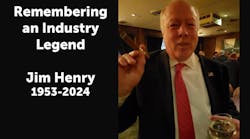What does security mean to you?
I've been thinking a lot about that question in the last few days as I responded to Hurricane Katrina.
When I had last spoken with my parents, they were staying in their home on the beach in Pass Christian, Miss., a town between Gulfport and New Orleans. That was Sunday afternoon, before Katrina reached land.
On Tuesday morning, after working all night to put together finishing touches on security industry stories that you see on our site, I loaded up my truck with emergency response and survival equipment from my garage and set off for the Mississippi Gulf Coast, leaving Atlanta. I had still not heard from my parents, and the early reports I saw painted a grim, grim picture.
Eleven hours and countless detours later, I had been redirected away from quickly established military checkpoints and police roadblocks. Having grown up on the Coast, I was able to take the backroads that hadn't been closed by police and where the local farmers had taken out their chainsaws and cleared a somewhat usable path down rural roads. I reached the house after getting lost on roads I grew up on. With the signs gone and many landmarks destroyed, I felt at times that I was in a land I'd never seen before.
Ten miles from the coast, I stopped in at the West Harrison County Volunteer Fire Station. Even with my GPS unit I was still lost. The roads that were passable weren't the ones the mapping program knew. Inside the station, which had been partly ripped apart from the winds, I found a young family holed away. The father, a firefighter at the station, clued me in to which road I was on -- it was one I had driven hundreds of times on my way to our family farm, and I didn't recognize it. When I told him where I would be looking for my parents, he was silenced and looked like he was holding back. "It's real bad," was all he could say.
A half-hour and many more detours later, it was 10 p.m., and I was driving down roads, dodging powerlines and downed trees. I had the radio off and my window down and except for the occasional site of a police officer in his cruiser, the area was eerily quiet. I eased my way through deep water covering roads, rolled tentatively across low bridges that were structurally marginal even before the storm. Gazing out of my window at the damage, I was muted by the destruction of everything I saw.
In the quiet of this dismal night, I passed the noise of a generator at the Pass Christian Fire Department Station and drove two more blocks to the gravel driveway that led forward to my parents house. I pulled on my boots and grabbed a heavy-duty Mag Lite and started trudging through the mud toward the house. The smell of decay and free flowing natural gas from ruptured lines overwhelmed my senses. As I climbed out of a pile of downed trees, I started to see my parents' belongings.
When I saw major parts of their house under my feet, my heart dropped. I walked forward, stepping over the stuff of their memories and following the light provided by my flashlight, coming upon a random car left under a tree in my family's backyard. My family's own cars were half-pushed through walls of the garage and had come to rest up against beams. Fifty feet further and I was nearing the house, which was tilted, cracked and had gaping chunks missing from it.
I said an instant prayer that I would not be finding my mother or father's bodies and then I pushed toward the uprooted, scrambled structure of a home that had survived since just after the Civil War. I stepped up into what was left of home's side entrance over a pile of rubble and stood there in the most amazing sight -- my father had written on the wall: "Steve and Helen Kohl are OK - 8/29/05". I shouted their names but heard no response and moved around to the front of the house where a hundred year old magnolia tree had crashed down. I stood where the porch had been and looked inside the shell of the house, now 15 feet from its former foundations. With no word from my shouts, I knew they were not inside. It was then that I turned around and looked out at the Gulf of Mexico, which lapped in a deceptively peaceful manner against the beach in front of the house.
An hour later and I had been by the town fire station again and was told by the chief that he had seen my father, walking toward the next town where his business was. I collected a young couple in the back of my truck and delivered them to the Long Beach, Miss., shelter where I searched in vain for my own parents. Lost again, a Long Beach police officer, once he knew I wasn't a looter, helped direct me through the darkened town to my father's business. Partially razed as well, I shouted their names to no avail. "Are you looting?", a male voice called out from the upper floor of apartments behind his shop. It was not my father. The alarm system's keypad flashed erratically inside the front door, grabbing juice from the phone line, somehow staying connected through the destruction.
I found life around the corner at Leggett's Firestone, where an old acquaintance of mine had a generator and was standing guard against looters at the blown out entrances to the shop with his German Shepherd and his shotgun. Realizing we knew each other, Eric filled me in on what was happening as the police cruisers raced by to respond to calls of looting attacks in town. He explained how there had been an understanding with the police that business owners were OK'd to fire at looters. His cell phone chirped up and all of a sudden, we had service. Thirteen voicemails later, I got the message from my sister that my mother and father were okay, had found a friend with a usable car and had been able to leave the area just an hour before I arrived. As I left town to catch up with them in Alabama, I stopped by a shopping center and was flagged down by the town police who were there arresting looters. The officer told me that the town was under Marshall law and politely suggested that I hurry out of town.
What can I say about security? In a way, this entire disaster is about security. Security is about knowing that a business is safe -- against looting, against attacks. Security is about the lives of family members -- knowing that they are safe, that their homes are protected. Security is knowing that the alarm system at the family business is still trying to work, still trying to connect to a central station even though a hurricane may have washed away both the phone lines and the central station. Security is knowing that the security director at a hotel is advising his guests on how to protect themselves as they witness a hurricane. Security is the activity of sworn law officers protecting citizens, patrolling their swamped streets, and helping direct dazed victims to shelters.
As an industry, it's our duty to protect people's lives and property. Having seen Katrina's damage firsthand, I ask that all of you in the industry go to the disaster relief organizations and donate anything you can. The needs of people in that area are incredible, and I know their hearts will be lifted by your support. I'd recommend the Red Cross, but any relief organization you choose is a good choice.
On the same note: Is your company doing anything to accelerate the relief effort? If so, email [email protected] and let us know of your efforts and I'll list your efforts on our site. Even if your company is only sending $1, let us know and we'll post your effort. Every little bit helps because these people have very little except hope right now.
Thank you all for your support of SecurityInfoWatch.com, and I promise we'll be back next week with a focus on ASIS and the standard fare of alarm panels, cameras, gates, guards and the business of security. Finally, here's a list of some of our most popular stories from the week:
- Looters Hit Hurricane-Damaged Retailers in Mississippi, Louisiana
- Hospital Security: The Past, The Present, and The Future
- Creating a Fix for the Security Industry's Workforce Shortage
- Industry Insiders on the Real Importance of 'It Takes a Thief'
- Securitas Hit Again in Sweden
- Dispelling the Top 10 Myths of IP Surveillance: Myth No. 7
- Live from ISC East: Photos from the Show, Page 2
- Advice to the Traveling American Executive
- Moving Toward IP Using RJ-45 Connected UTP Wiring

